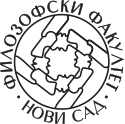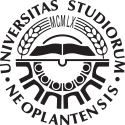Ibero-American Center
Ibero-American Center
The Ibero-American Center CIBAM was founded in June 2020 at the suggestion of the Spanish Language Chair within the Department of Romance Studies at the Faculty of Philosophy, University of Novi Sad and in cooperation with the Association of Hispanists of Serbia. It was created as a space for activities related to Hispanic and Lusophone themes, with an aim to establish concrete cooperation with numerous universities from Spain, Portugal, Latin America and the Caribbean, organize professional and scientific events focused on cultural, linguistic, historical, social and political trends in Ibero-America and to deal with complex issues of identity, migration and environmental protection.
Management of the Center:
Manager of the Center: Bojana Kovačević Petrović
Secretary of the Center: Jelena Borljin
Coordinators for the Spanish language: Sanja Maričić Mesarović and Ivana Georgijev
Coordinator for Latin American Literature: Moises Moreno
Coordinator for Latin American Culture: Viktorija Riveros Mitrović
CONTACT:
Iberoamerički centar / Centro Iberoamericano
Filozofski fakultet Univerziteta u Novom Sadu
Dr Zorana Đinđića 2a
21000 Novi Sad, Srbija
http://ff.uns.ac.rs/sr-lat/fakultet/o-fakultetu/centri/iberoamericki-centar/centro-iberoamericano
The cultural identity of the Spanish and Portuguese-speaking areas is based on a rich, intertwined, pre-Hispanic and European past, imbued with elements of the old and new world, indigenous heritage and modern tendencies. Despite the fact that this linguistic and ethnic multicultural environment embodies a unique, authentic, and most interesting geographical, historical and civilizational area, the political, economic, social, educational, and cultural relations with the Ibero-American area are still underdeveloped in our region.
Spanish, which is used on Ibero-American soil along with Portuguese and over five hundred living indigenous languages, is officially spoken in twenty-one countries and is considered the second most important language in the world and the third largest on the planet by the number of people who speak it. According to the official information of the Institute Cervantes, there are over 577 million people around the globe who speak the Spanish Language. The Eurobarometer research, published at the end of 2019, shows that young people in 20 of the 28 European Union countries are most interested in learning Spanish, and a recent survey in the UK noted that Spanish is the most important language for the future. When we add to those figures about 230,000,000 inhabitants of Brazil and the inhabitants of Jamaica, Haiti, and other Caribbean countries, we are talking about a billion people who cover the Ibero-American area.
At the Faculty of Philosophy, University of Novi Sad, Spanish was introduced in 1997, as an elective language at the Department of Romance Studies. Today, almost four hundred students study Spanish at the Faculty of Philosophy and there is a huge interest in the topics related to the Iberian peninsula and Latin American continent. Thus, in order to encourage the development of the cultural and creative sector, enriching the educational and cultural offer of the local community, intercultural approach, working with young people, their association and nurturing critical thinking, the Ibero-American Center would be the center of all current and future programs and projects related to Latin America, The Caribbean, the Iberian Peninsula, and the Balkans, i.e. the point where academic, cultural, social, political, and even economic threads intertwine that connect Serbia and the region with Ibero-American countries.
Since its establishment, CIBAM has organized around 30 events: vitists of ambassadors of Spain, Mexico, and Brasil in Serbia; lectures on Spanish and Latin American literature, music and socio-politic tendencies given by national and international lecturers; workshops on translation, investigation and scientific papers writing, festivities; homage to Mario Benedetti, online discussion on post-pandemic literature with Luisa Valenzuela, Ana María Shua, Samanta Schweblin, and Guillermo Martínez; students’ literary competition on poetry, essay, and short story; courses on Culture and Civilizacion and Literary Critics supported by the Spanish Ambassy in Belgrade; a project on translation of 100 Latin American myths and legends with participation of 125 young translators, etc. Some of the programs have been realized in collaboration with Spanish Ambassy, Mexican Ambassy, Argentinian Embassy, Brazilian Ambassy, Institute Cervantes in Belgrade, the Association of Spanish Teachers of Serbia, and the Association of Hispanists of Serbia.

